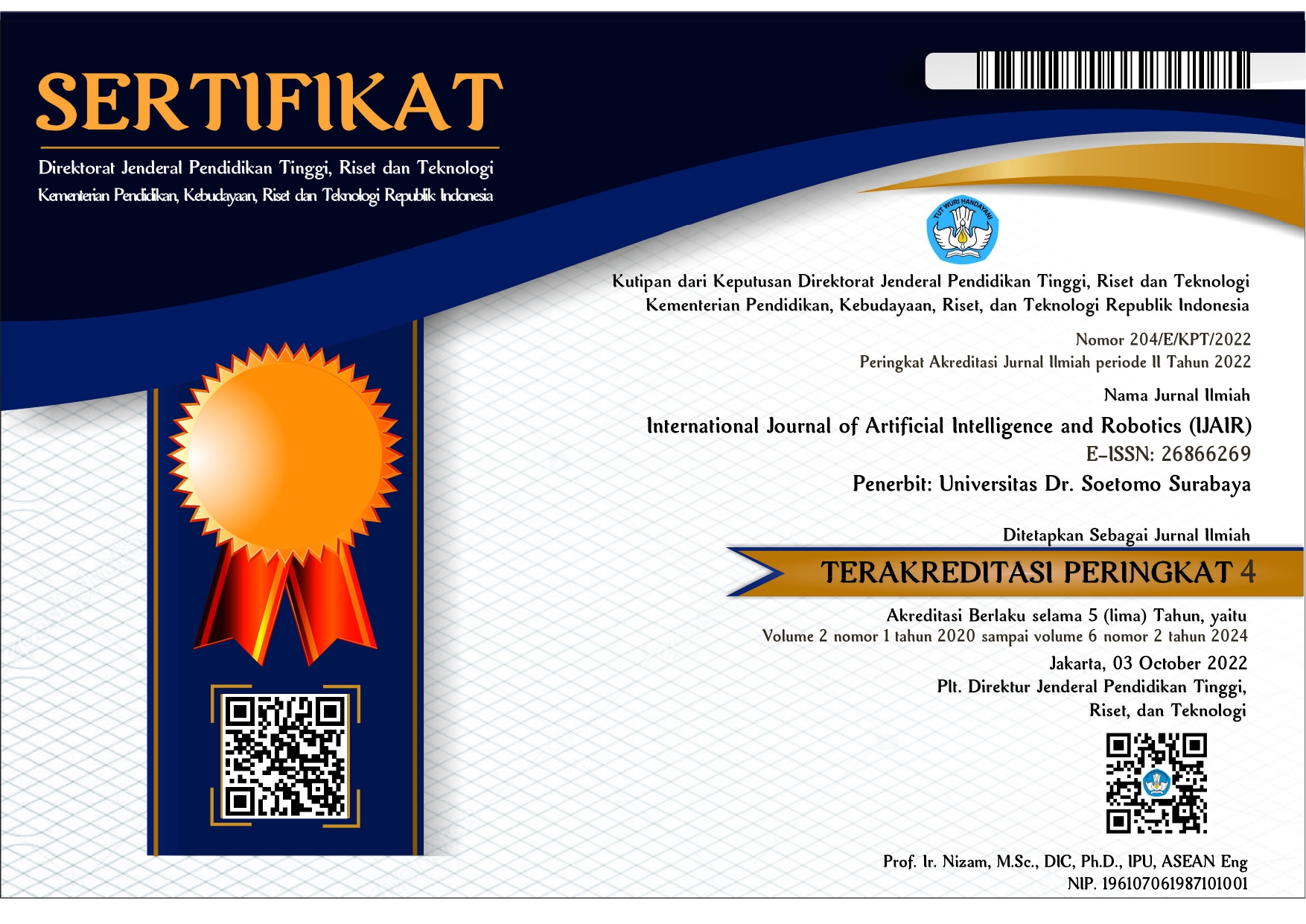Comparison of Memetic Algorithm and Genetic Algorithm on Nurse Picket Scheduling at Public Health Center
 Abstract views: 317
,
Abstract views: 317
,
 PDF downloads: 245
PDF downloads: 245
Abstract
One of the most significant aspects of the working world is the concept of a picket schedule. It is difficult for the scheduler to make an archive since there are frequently many issues with the picket schedule. These issues include schedule clashes, requests for leave, and trading schedules. Evolutionary algorithms have been successful in solving a wide variety of scheduling issues. Evolutionary algorithms are very susceptible to data convergence. But no one has discussed where to start from, where the data converges from making schedules using evolutionary algorithms. The best algorithms among evolutionary algorithms for scheduling are genetic algorithms and memetics algorithms. When it comes to the two algorithms, using genetic algorithms or memetics algorithms may not always offer the optimum outcomes in every situation. Therefore, it is necessary to compare the genetic algorithm and the algorithm's memetic algorithm to determine which one is suitable for the nurse picket schedule. From the results of this study, the memetic algorithm is better than the genetic algorithm in making picket schedules. The memetic algorithm with a population of 10000 and a generation of 5000 does not produce convergent data. While for the genetic algorithm, when the population is 5000 and the generation is 50, the data convergence starts. For accuracy, the memetic algorithm violates only 24 of the 124 existing constraints (80,645%). The genetic algorithm violates 27 of the 124 constraints (78,225%). The average runtime used to generate optimal data using the memetic algorithm takes 20.935592 seconds. For the genetic algorithm, it takes longer, as much as 53.951508 seconds.
Downloads
References
A. A. El Adoly, M. Gheith, and M. Nashat Fors, "A new formulation and solution for the nurse scheduling problem: A case study in Egypt," Alexandria Eng. J., vol. 57, no. 4, pp. 2289–2298, Dec. 2018.
A. S. Koli, T. Rajodwala, and A. Mittal, "Comparison of Evolutionary Algorithms for Timetable Scheduling," pp. 1351–1359, 2020.
R. Hariyanto and M. Z. Sarwani, "Optimizing K-Means Algorithm by Using Particle Swarm Optimization in Clustering for Students Learning Process," Inf. J. Ilm. Bid. Teknol. Inf. dan Komun., vol. 6, no. 1, pp. 65–68, 2021.
F. I. Amadin, D. Ph, M. E. Bello, and B. Sc, "A Genetic Neuro Fuzzy Approach for Handling the Nurse Rostering Problem," vol. 19, no. June, pp. 198–205, 2018.
Y. Yudriani, E. C. Djamal, and R. Ilyas, “Optimalisasi Penjadwalan Jaga Dokter dan Tenaga Medik di Rumah Sakit Dustira Menggunakan Algoritma Genetika,” no. September, pp. 40–44, 2017.
Andriansyah, N. Alfadilla, P. D. Sentia, and D. Asmadi, "Optimization of Nurse Scheduling Problem using Genetic Algorithm: A Case Study," IOP Conf. Ser. Mater. Sci. Eng., vol. 536, no. 1, 2019.
A. Y. E. Dodu, D. W. Nugraha, and S. D. Putra, “Penjadwalan Tenaga Kebidanan Menggunakan Algoritma Memetika,” J. Sist. Inf. Bisnis, vol. 8, no. 1, p. 99, 2018.
C. T. TAURAI, "A Timetable Planner for Bindura University of Science Education using Genetic Algorithm," no. June, 2017.
N. I. Kurniati, A. Rahmatulloh, and D. Rahmawati, “Perbandingan Performa Algoritma Koloni Semut Dengan Algoritma Genetika – Tabu Search Dalam Penjadwalan Kuliah,” Comput. Eng. Sci. Syst. J., vol. 4, no. 1, p. 17, 2019.
Y. Sari, M. Alkaff, E. S. Wijaya, S. Soraya, and D. P. Kartikasari, “Optimasi Penjadwalan Mata Kuliah Menggunakan Metode Algoritma Genetika dengan Teknik Tournament Selection,” J. Teknol. Inf. dan Ilmu Komput., vol. 6, no. 1, p. 85, 2019.
H. Husada, I. Cholissodin, and F. A. Bachtiar, “Optimasi Penjadwalan Kuliah Pengganti Menggunakan Algoritme Genetika,” J. Pengemb. Teknol. Inf. dan Ilmu Komput. Univ. Brawijaya, vol. 2, no. 9, 2018.
A. Haifan and dkk, “Sistem Penjadwalan Praktikum Menggunakan Algoritma Genetika,” Tek. Inform. – ITN Malang, vol. 4, no. 1, pp. 1–8, 2018.
F. Mone and J. E. Simarmata, "Application of Genetic Algorithm in Scheduling Subjects," vol. 15, no. 4, pp. 615–628, 2021.
M. Cai and Y. Zuo, "A hybrid ant colony optimization algorithm based on MapReduce," vol. 3, no. 3, pp. 305–326, 2016.
M. R. M. Umar Hasan, Teguh Iman Hermanto, “PENJADWALAN MATA KULIAH MENGGUNAKAN ALGORITMA GENETIKA DI STT WASTUKANCANA PURWAKARTA,” 2018.
H. Pranata, “Sistem penjadwalan shift kerja anggota kepolisian menggunakan algoritma genetika,” 2019.
A. Yudistira, E. C. Djamal, and R. Yuniarti, “Optimalisasi Penjadwalan Audit di Inspektorat Daerah Kabupaten Cianjur Menggunakan Algoritma Genetika,” Semin. Nas. Apl. Teknol. Inf., pp. 1907–5022, 2017.
A. Goli, E. B. Tirkolaee, I. Mahdavi, and M. Zamani, "Solving a University Exam Scheduling Problem Using Genetic and Firefly Algorithms."
V. Sahargahi and M. F. Drakhshi, "Comparing the Methods of Creating Educational Timetable," vol. 16, no. 12, pp. 26–36, 2016.
S. E. Haupt, "Introduction to genetic algorithms," Artif. Intell. Methods Environ. Sci., pp. 103–125, 2009.
Copyright (c) 2022 Nico Nico, Novrido Charibaldi, Yuli Fauziah

This work is licensed under a Creative Commons Attribution-ShareAlike 4.0 International License.
Authors who publish with International Journal of Artificial Intelligence & Robotics (IJAIR) agree to the following terms:
-
Authors retain copyright and grant the journal right of first publication with the work simultaneously licensed under a Creative Commons Attribution License (CC BY-SA 4.0) that allows others to share the work with an acknowledgment of the work's authorship and initial publication in this journal.
-
Authors are able to enter into separate, additional contractual arrangements for the non-exclusive distribution of the journal's published version of the work (e.g., post it to an institutional repository or publish it in a book), with an acknowledgment of its initial publication in this journal.
-
Authors are permitted and encouraged to post their work online (e.g., in institutional repositories or on their website) prior to and during the submission process, as it can lead to productive exchanges, as well as earlier and greater citation of published work.















